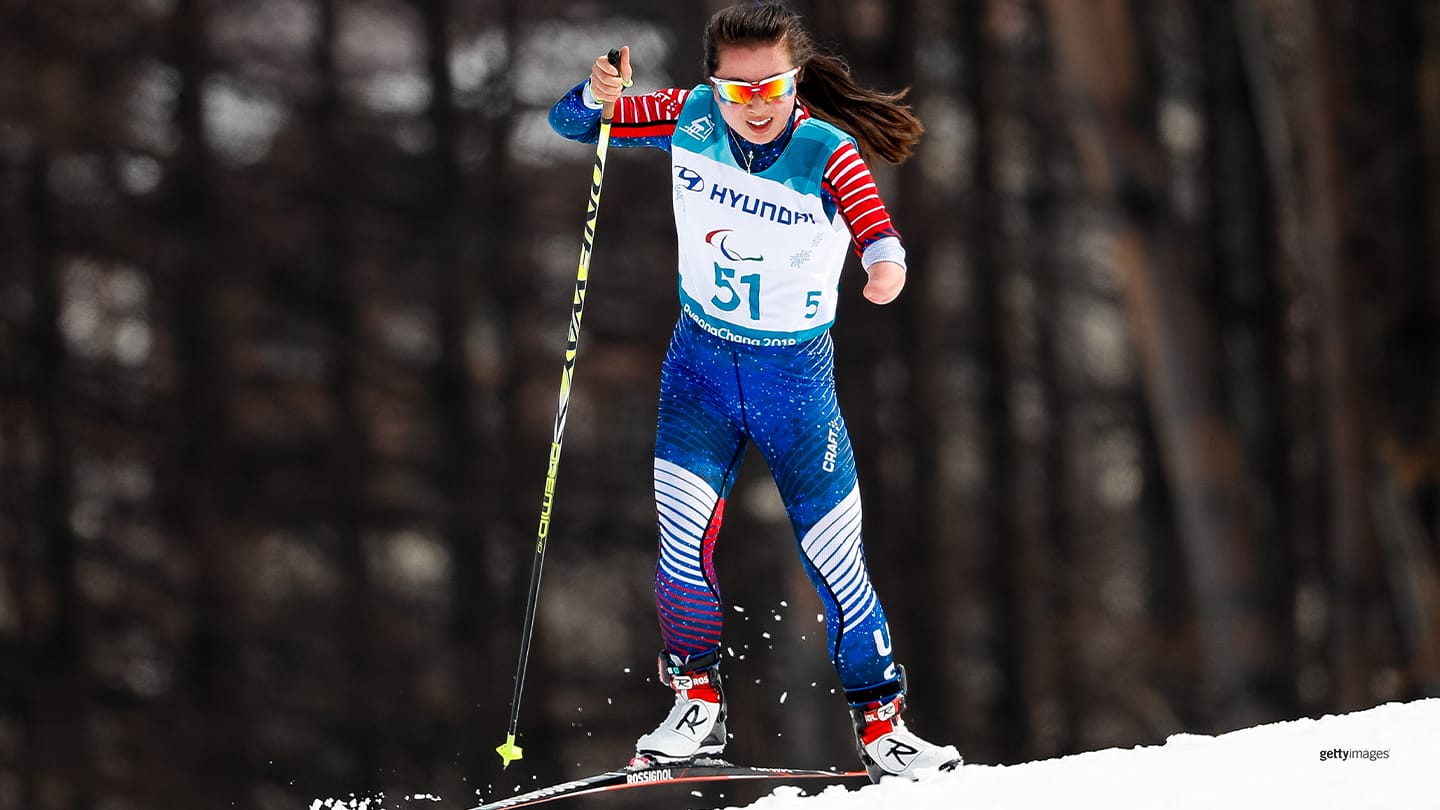
Paralympian Grace Miller Wraps Up College Degree While Looking Ahead To Games
by Stuart Lieberman

Grace Miller competes in the women's 15km Free at the Paralympic Games PyeongChang 2018 on March 12, 2018 in PyeongChang, South Korea.
Imagine waking up to frigid cold temperatures and brutally dark skies every day at 6 a.m. mid-winter in Alaska and having to strap on your skis and get on the trails. And then after that, having to attend a full slate of college classes before returning to the trails for another training session in the afternoon.
That’s been Grace Miller’s routine at the University of Alaska for the last three years.
“It gets so dark and cold,” said the U.S. Paralympian. “In Fairbanks, we’d train until minus 10 and once it got to minus 10 we’d train inside. We have these duckbills — devices you put in your mouth that help warm up the air before you breathe in otherwise it will absolutely kill your lungs. A lot of times we also ski with head lamps, and most of the trails in Fairbanks were lit that we’d ski on.”
At 21, and one of the youngest members of the U.S. Paralympics Nordic Skiing Team, Miller has found her collegiate skiing experience one of the most rewarding in her career thus far.
Adopted from a Chinese orphanage made of stone at age 3 and raised in Palmer, Alaska, Miller began skiing at the age of 4 thanks to her mom Kymberly, a ski coach. Mother and daughter quickly bonded over skiing and Miller was on the Nordic ski team in middle school and high school. She chose to attend the University of Alaska because of “the abundance and ease of access to the outdoors,” having ski trails right outside of her dorm room, along with mountains, glaciers and the ocean to explore. She spent the first two years at the Fairbanks campus and then transferred to Anchorage for her final year.
“Having a consistent training group is so key to being fit,” said Miller, who was born without a left forearm. “Over the summer, I had to train by myself a bit when the pandemic was worst in Alaska, and having to do that every day, 10-20 hours a week gets really boring.
“When you’re a college athlete, everyone is under the same pressure of trying to perform in both school and our sport, so that’s nice to bond over. The intensity — training twice a day with a team and being able to work out with other elite athletes — makes you work so much harder.”
In her Paralympic debut at the Paralympic Winter Games PyeongChang 2018 — coming before she even graduated high school — Miller finished 10th in the 15-kilometer cross-country, 12th in the 4x2.5km cross-country and 18th in the 7.5km cross-country in the standing category.
“It was the most motivating event I’ve ever been to,” Miller told TeamUSA.org a few months after the Games. “My performances definitely could have been better, but I wasn’t expecting much going into it because I was still so new.”
Miller is new no more. Since then, between capturing mesmerizing photos of Alaskan glaciers, waterfalls, hot springs and mountain peaks for her Instagram, she won a national title in 2019 and has almost finished her degree in biology in three years. Luckily for Miller, other than being unable to travel for certain collegiate races, the COVID-19 pandemic hasn’t had as big of an impact on her training compared to others, as she competes in an outdoor sport and it’s pretty easy to stay socially distanced in Alaska.
Expecting to graduate next month, she hopes to one day work in the medical field, but in the meantime is planning to take a gap year leading up to the Beijing 2022 Paralympic Games. This fall, she will move to Bozeman, Montana, to train full-time with the U.S. national team.
But if she makes it to the podium in Beijing, she certainly won’t forget the collegiate program back in Alaska and all her teammates who got her there.
“If you have the opportunity to train with a college team, I would 100 percent recommend it,” she said.
Stuart Lieberman covered Paralympic sports for three years at the International Paralympic Committee, including at the London 2012 and Sochi 2014 Games. He is a freelance contributor to TeamUSA.org on behalf of Red Line Editorial, Inc.